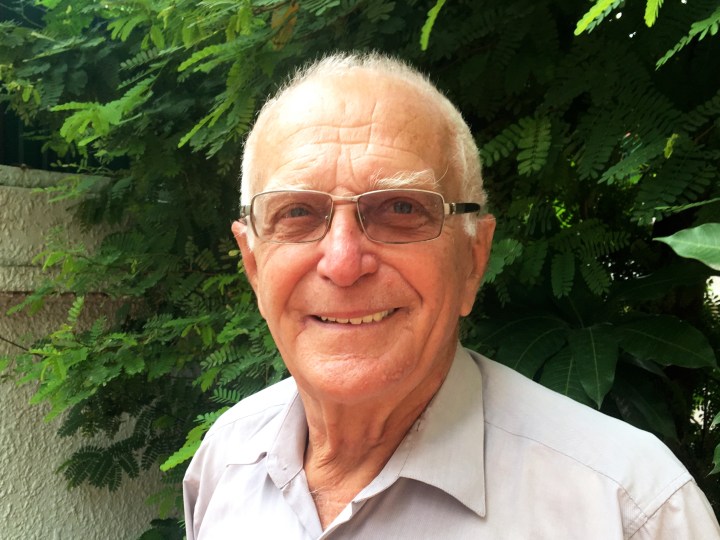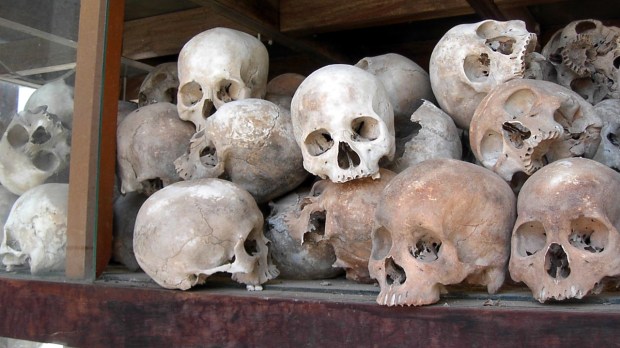Fr. François Ponchaud, S.J., was a newly-ordained 26-year-old when the Paris Foreign Missions Society (M.E.P.) sent him to Cambodia in 1965. Ten years later, he was one of the last Westerners evacuated before the Khmer Rouge regime devoured the country.
In fact, Ponchaud personally handed over the French embassy’s keys to a Khmer Rouge officer. The French priest, who is fluent in Khmer (the name of both the Cambodian language and the nation’s leading ethnic group) had served as a translator for three frantic weeks following the Apr. 17, 1975, takeover of the capital city, Phnom Penh.

Soon after returning to France, he wrote articles for La Croix and Le Monde newspapers, thereby becoming one of the first people to spread word about the human rights catastrophe underway in Cambodia. He then went back to Southeast Asia to meet with Cambodians at refugee camps in neighboring Thailand. Their accounts of Khmer Rouge atrocities were almost beyond belief.
In 1977, Ponchaud’s book Cambodge, année zéro(Cambodia: Year Zero) saw publication. The “year zero” title referred to the Khmer Rouge concept of pressing the restart button on Khmer civilization. This lofty goal involved stripping Cambodia of every trace of modernity and returning it to a society as seen close to a millennium ago, when the Khmer empire dominated Southeast Asia.
Aside from his own observations, Ponchaud’s book included the statements of some 100 Cambodian refugees. Some prominent intellectuals took issue with the book, however, and claimed the refugees were grossly embellishing their stories.
The refugees’ accounts were so extreme that Ponchaud himself was initially skeptical. But he was able to crosscheck and authenticate through interviews with many sources along with transcripts of Khmer Rouge broadcasts smuggled out of Cambodia.
These refugees weren’t simply fleeing a run-of-the-mill dictatorship. The Khmer Rouge had taken totalitarianism to a new level, converting its country into a forced labor camp, complete with starvation and constant threat of execution and torture. Former high schools became interrogation dungeons and surgical training centers. It didn’t matter that there was no anesthetic, or that most inmates had nothing worthwhile to confess. Everyone was guilty as charged.
At the time the Khmer Rouge took power, Cambodia had a population of about 7.5 million. Over the next four years, about one-fourth of them were killed. The ruling regime had created a hell on earth, and unleashed it on their own people.
Only after the Vietnamese invaded in 1979 did solid proof of Khmer Rouge atrocities emerge, thereby giving grim validation to the nightmarish accounts in Ponchaud’s book.
Liberated from the Khmer Rouge, a devastated Cambodia saw ten more years of tumult with the Cambodia-Vietnam War. Meanwhile, Ponchaud established Espace Cambodge, which aimed to assist Cambodians living in France.
In 1993, Cambodia had finally regained some semblance of stability and reopened its borders to foreign missionaries. Ponchaud returned and established the Cambodian Catholic Cultural Center (CCCC) to teach the Khmer language to missionaries and other volunteers. Along with this endeavor, he also taught seminarians, held weekly lectures on Cambodian history and culture, and translated the Bible into Khmer with the Cambodian Bible Society.
In this predominantly Buddhist nation, only about 0.2 percent of the total population is Catholic, and the majority of that small group consists of ethnic Vietnamese living in Cambodia.
Ponchaud did not see it as his role to make converts. He would even allow his own Catholic parishioners to partake in Buddhist practices like bringing food as a holy offering, or sitting on the floor and burning incense.
Whether the people he met worshiped Jesus or the Buddha, he just wanted them to see the intrinsic value of life, even if that life was one of poverty. Much of the country has remained impoverished. After all, Cambodia endured Year Zero and basically had to rebuild from nothing.
Ponchaud, who in 2013 testified at the war crime trials of former Khmer Rouge leaders, has admitted to giving up on all political systems.
Though he retired to France on Dec. 21, 2021, Ponchaud, now age 82, can revisit Cambodia when he wishes. Aside from his possessing Cambodian citizenship, many of the people there respect his value as a humanitarian. When others denied the presence of evil, he did his best to remind the world that it exists – and can swallow countries whole.

